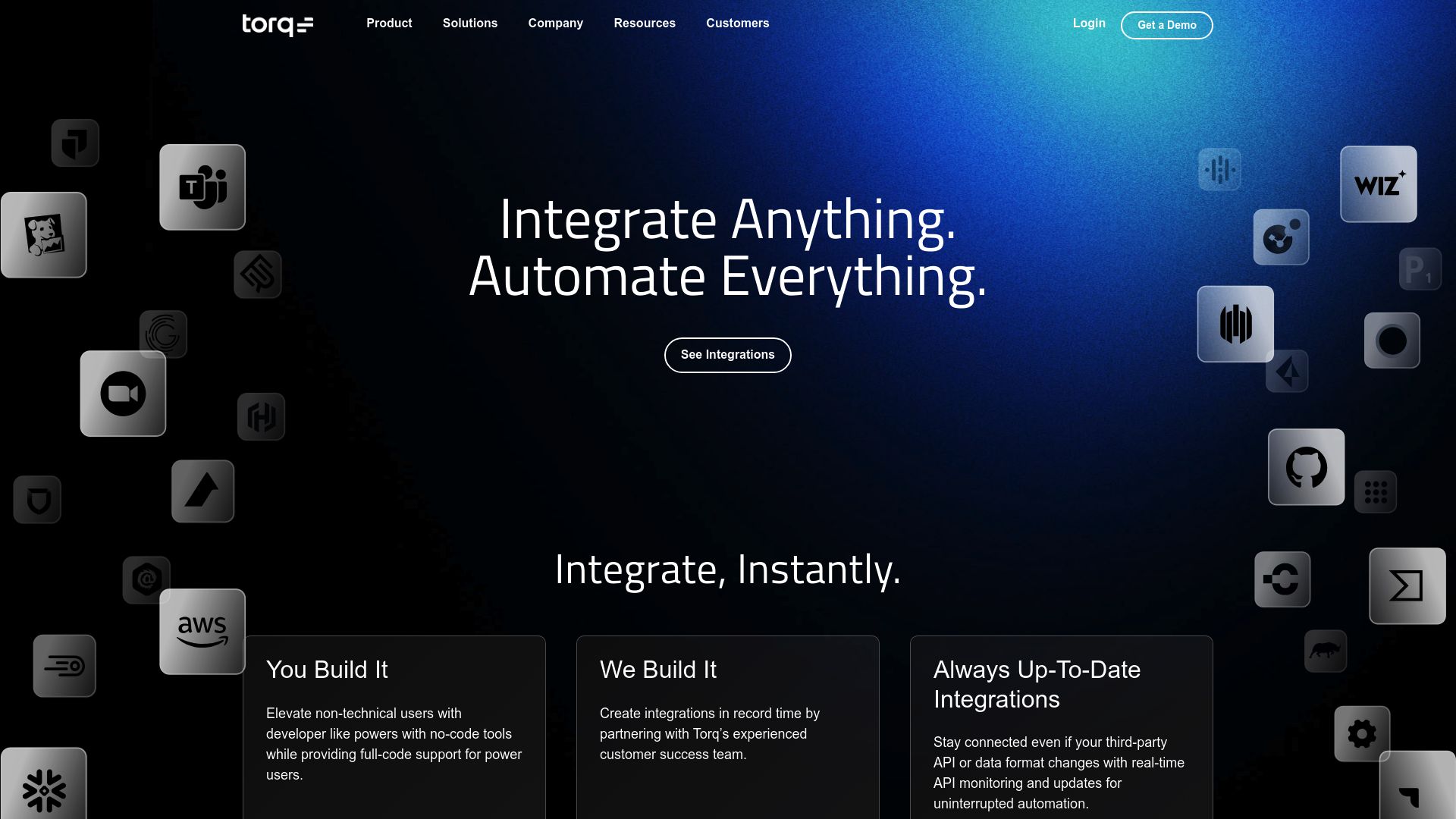Torq Hyperautomation vs. DevGPT: Security and AI Automation Compared
AI-powered automation revolutionizes business processes across industries. Our comparison of Torq Hyperautomation vs. DevGPT, and SmythOS reveals distinct approaches to this transformative technology. Torq Hyperautomation specializes in security-focused workflows, DevGPT excels in AI-assisted coding, while SmythOS offers a versatile platform combining security and AI capabilities. This review examines each solution’s strengths, limitations, and ideal use cases. Whether you’re a security professional seeking robust automation, a developer looking to streamline coding tasks, or an organization aiming for comprehensive AI integration, our analysis provides valuable insights to guide your decision-making process.
Torq Hyperautomation Overview
Torq Hyperautomation empowers enterprises with a robust security-focused hyperautomation platform. The software streamlines complex security workflows, enabling organizations to respond swiftly to threats and orchestrate intricate processes at scale.


Torq’s platform excels in automating security operations through customizable workflows. Users leverage a visual designer to craft intricate automation sequences without coding expertise. The system supports various triggers, from third-party service events to scheduled tasks, initiating workflows seamlessly.
Torq’s platform excels in automating security operations through customizable workflows. Users leverage a visual designer to craft intricate automation sequences without coding expertise.
Key features include modular steps for specific actions, persistent variables for data management, and extensive third-party integrations. These components work in concert to create a comprehensive automation ecosystem. Torq’s case management functionality further enhances its utility, automating the entire lifecycle of security events.
The platform’s workspace feature facilitates collaboration and resource sharing with role-based access controls. This design caters to enterprise needs for scalability and team coordination. However, Torq’s focus on security automation may limit its applicability in non-security contexts.
Torq integrates smoothly with existing security stacks, enhancing its value proposition for organizations with established infrastructures. The platform’s emphasis on API-based interactions and support for various authentication methods ensures compatibility across diverse environments.
In the competitive landscape, Torq positions itself as a specialized solution for security-centric hyperautomation. Its strength lies in its deep integration with security tools and processes. While this specialization is advantageous for security-focused enterprises, it may not suit organizations seeking a more generalized automation platform.
DevGPT Overview
DevGPT empowers developers to automate coding tasks through AI-assisted code generation. This open-source tool transforms natural language descriptions into executable code, streamlining development workflows and boosting productivity.


DevGPT’s key features include personalized training on a developer’s codebase, editable AI-generated outputs, and integration with popular development tools like GitHub and Jira. The platform leverages advanced language models such as GPT-4 and Codex to produce context-aware code snippets that align with individual coding styles.
DevGPT empowers developers to automate coding tasks through AI-assisted code generation. This open-source tool transforms natural language descriptions into executable code, streamlining development workflows and boosting productivity.
While DevGPT excels at automating repetitive coding tasks, its current focus on individual developers and small teams may limit its appeal for large enterprises. The tool’s effectiveness hinges on the quality of its language model training and the accuracy of its code generation, which may vary depending on the complexity of the coding task.
DevGPT’s integration capabilities extend its utility beyond standalone code generation. By connecting with version control systems and project management tools, it streamlines the entire development process from task creation to pull request generation. This seamless workflow integration positions DevGPT as a valuable asset for developers seeking to enhance their productivity and focus on complex problem-solving.
As an emerging player in the AI-assisted development space, DevGPT aims to become an indispensable coding companion. Its vision includes expanding accessibility to companies of all sizes and fostering an engaged community of users and contributors. By continually refining its AI models and expanding its feature set, DevGPT strives to address the evolving needs of modern software development teams.
Feature Comparison
Torq Hyperautomation and DevGPT offer distinct approaches to automation, with key differences in their core capabilities and target use cases. Torq focuses on security-centric hyperautomation, providing robust workflow automation for security operations. DevGPT, in contrast, specializes in AI-assisted code generation for developers.
Torq excels in security automation with features like customizable workflows, extensive third-party integrations, and automated case management. Its platform supports complex security processes and incident response automation. DevGPT, however, lacks these security-specific features, instead concentrating on transforming natural language prompts into code snippets.
In terms of core components, Torq offers a visual workflow designer and supports various triggers and actions within security contexts. DevGPT’s core strength lies in its AI-powered code generation capabilities, leveraging models like GPT-4 and Codex. This fundamental difference in focus results in a significant feature gap between the two platforms.
The security features of Torq, including detailed execution logs and support for multiple authentication methods, outshine DevGPT’s offerings in this area. While DevGPT integrates with development tools like GitHub and Jira, it lacks the comprehensive security measures inherent in Torq’s design.
We’ve designed SmythOS to bridge these gaps, offering a versatile platform that combines the strengths of both security automation and AI-assisted development. Our solution provides robust security features alongside powerful AI capabilities, catering to a wider range of use cases and user needs.
Feature Comparison Table
| Torq Hyperautomation | DevGPT | SmythOS | |
|---|---|---|---|
| CORE FEATURES | |||
| Hosted Agents (Dev, Production) | ✅ | ❌ | ✅ |
| Environments (Dev, Production) | ✅ | ❌ | ✅ |
| Visual Builder | ✅ | ❌ | ✅ |
| No-Code Options | ✅ | ❌ | ✅ |
| Autonomous Agents | ✅ | ❌ | ✅ |
| Explainability & Transparency | ❌ | ❌ | ✅ |
| Multimodal | ✅ | ❌ | ✅ |
| Problem-Solving Capabilities | ❌ | ✅ | ✅ |
| Multi-Agent Collaboration | ✅ | ❌ | ✅ |
| Human-AI Interaction | ❌ | ✅ | ✅ |
| Audit Logs for Analytics | ✅ | ❌ | ✅ |
| Bulk Work | ✅ | ❌ | ✅ |
| Agent Work Scheduler | ✅ | ❌ | ✅ |
| Logs & Monitoring | ✅ | ❌ | ✅ |
| SECURITY | |||
| Constrained Alignment | ✅ | ❌ | ✅ |
| Data Encryption | ✅ | ❌ | ✅ |
| OAuth | ✅ | ❌ | ✅ |
| IP Control | ✅ | ❌ | ✅ |
| COMPONENTS | |||
| Foundation AIs | ✅ | ❌ | ✅ |
| Huggingface AIs | ❌ | ❌ | ✅ |
| Zapier APIs | ❌ | ❌ | ✅ |
| All other APIs, RPA | ❌ | ❌ | ✅ |
| Classifiers | ✅ | ❌ | ✅ |
| Logic | ❌ | ❌ | ✅ |
| Data Lakes | ✅ | ❌ | ✅ |
| DEPLOYMENT OPTIONS (EMBODIMENTS) | |||
| Deploy as API | ❌ | ❌ | ✅ |
| Deploy as Webhook | ✅ | ❌ | ✅ |
| Staging Domains | ✅ | ❌ | ✅ |
| Production Domains | ❌ | ❌ | ✅ |
| API Authentication (OAuth + Key) | ❌ | ❌ | ✅ |
| Deploy as Site Chat | ✅ | ❌ | ✅ |
| Deploy as Scheduled Agent | ❌ | ❌ | ✅ |
| Deploy as GPT | ✅ | ❌ | ✅ |
| Scalability | ❌ | ❌ | ✅ |
| DATA LAKE SUPPORT | |||
| Hosted Vector Database | ✅ | ❌ | ✅ |
| Sitemap Crawler | ❌ | ❌ | ✅ |
| YouTube Transcript Crawler | ❌ | ❌ | ✅ |
| URL Crawler | ❌ | ❌ | ✅ |
| PDF Support | ❌ | ❌ | ✅ |
| Word File Support | ✅ | ❌ | ✅ |
Best Alternative to Torq Hyperautomation and DevGPT
SmythOS emerges as the superior alternative to Torq Hyperautomation and DevGPT, offering a comprehensive AI automation platform that combines the strengths of both security automation and AI-assisted development. Our solution bridges the gap between these specialized tools, providing a versatile platform suitable for a wide range of use cases.
We designed SmythOS with a user-friendly drag-and-drop interface, making it accessible to users of all skill levels. This visual builder allows for the quick creation of complex AI workflows without extensive coding knowledge, democratizing AI development across organizations. Unlike DevGPT’s focus on code generation, SmythOS enables the creation of autonomous agents capable of performing a variety of tasks, from simple automations to complex decision-making processes.
SmythOS enables the creation of autonomous agents capable of performing a variety of tasks, from simple automations to complex decision-making processes.
Our platform excels in its extensive integration ecosystem, supporting connections with various APIs, AI models, and tools. This flexibility ensures SmythOS fits seamlessly into virtually any workflow or business process. While Torq Hyperautomation specializes in security-centric automation, we offer robust security features alongside powerful AI capabilities, catering to a broader spectrum of automation needs.
SmythOS stands out with its multi-agent orchestration capabilities, allowing teams of AI agents to collaborate on complex tasks. This feature enhances efficiency and scalability, surpassing the limited collaboration options in Torq and DevGPT. Additionally, our platform provides versatile deployment options, including API endpoints, webhooks, chatbots, and scheduled agents, offering unparalleled flexibility in how AI solutions are integrated and utilized within existing systems.
We prioritize scalability and performance, ensuring that AI solutions built with SmythOS can effortlessly scale to meet growing demands without compromising speed or reliability. This focus on scalability, combined with our commitment to user-friendly design and extensive feature set, positions SmythOS as the ideal choice for businesses and developers looking to harness the full potential of AI automation across unlimited use cases.
Conclusion
Torq Hyperautomation and DevGPT offer specialized solutions for security automation and AI-assisted coding respectively. Torq excels in orchestrating complex security workflows, while DevGPT streamlines code generation for developers. However, SmythOS emerges as a versatile platform that combines the strengths of both, offering a comprehensive solution for diverse automation needs.
SmythOS’s drag-and-drop interface, extensive integration ecosystem, and multi-agent orchestration capabilities set it apart. Our platform supports a wide range of deployment options, from APIs to chatbots, making it adaptable to various business requirements. Unlike Torq’s security focus or DevGPT’s coding emphasis, SmythOS provides a flexible foundation for creating AI agents across multiple domains.
For organizations seeking a robust, scalable, and user-friendly AI automation platform, SmythOS stands out as the superior choice. We invite you to explore our diverse range of AI-powered agent templates and experience unlimited AI automation risk-free. Discover 300,000+ seamless integrations to supercharge your projects and deploy AI agents anywhere with our versatile platform. Start your journey towards AI-powered success today with SmythOS.
Last updated:
Disclaimer: The information presented in this article is for general informational purposes only and is provided as is. While we strive to keep the content up-to-date and accurate, we make no representations or warranties of any kind, express or implied, about the completeness, accuracy, reliability, suitability, or availability of the information contained in this article.
Any reliance you place on such information is strictly at your own risk. We reserve the right to make additions, deletions, or modifications to the contents of this article at any time without prior notice.
In no event will we be liable for any loss or damage including without limitation, indirect or consequential loss or damage, or any loss or damage whatsoever arising from loss of data, profits, or any other loss not specified herein arising out of, or in connection with, the use of this article.
Despite our best efforts, this article may contain oversights, errors, or omissions. If you notice any inaccuracies or have concerns about the content, please report them through our content feedback form. Your input helps us maintain the quality and reliability of our information.
